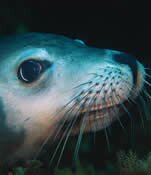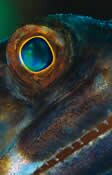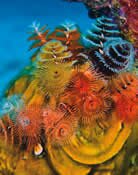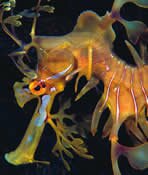Inflight Magazine of Brussels Airlines
Welcome to the Inflight Magazine of Brussels Airlines
Sea The Truth
Images Dos Winkel
Eco-warrior Dos Winkel started his diving and underwater photography career 26 years ago, and he has observed reefs depleting, mangroves disappearing and fish vanishing at a frightening rate. With the world facing the prospect of fishless oceans by 2050, he talks to Richard Bence about what can be done to halt this nightmare scenario
 At least 50-60% of all the fishing vessels in the world have to go. Mega trawlers catch tonnes of fish every minute, and now we’re afraid that within 40 years the sea will be without edible fish. This is very serious because not only will there be no more fish, but there’s also the huge problem of acidification of the oceans caused by carbon dioxide. The oceans can absorb 50% of the CO2 at most, and excessive carbon dioxide is dissolving all the structures that contain calcium, such as corals and plankton. The world will be without coral reefs because of the carbon dioxide by 2060, and plankton are disappearing too, which are the base of the world’s food chain.
At least 50-60% of all the fishing vessels in the world have to go. Mega trawlers catch tonnes of fish every minute, and now we’re afraid that within 40 years the sea will be without edible fish. This is very serious because not only will there be no more fish, but there’s also the huge problem of acidification of the oceans caused by carbon dioxide. The oceans can absorb 50% of the CO2 at most, and excessive carbon dioxide is dissolving all the structures that contain calcium, such as corals and plankton. The world will be without coral reefs because of the carbon dioxide by 2060, and plankton are disappearing too, which are the base of the world’s food chain.
“The oceans are the lungs of the world, more so than the rainforest – they provide 70% of the oxygen we breathe. Scientists say that, eventually, this could mean the end of mankind. The solution is simple: stop fishing. Fish need to stay in the oceans, rather than on our plates.
 “What’s more, 20% of all greenhouse gases come from the intensive cattle industry – that’s more than what’s produced by all vehicles in the world, including ships and planes – so we need to eat less meat. If everyone would have one or two vegetarian days each week (such as by following the meatfree www.mondays.co.uk initiative) we could save the oceans. And fish counts as meat.
“What’s more, 20% of all greenhouse gases come from the intensive cattle industry – that’s more than what’s produced by all vehicles in the world, including ships and planes – so we need to eat less meat. If everyone would have one or two vegetarian days each week (such as by following the meatfree www.mondays.co.uk initiative) we could save the oceans. And fish counts as meat.
I’m a vegetarian; there are so many delicious veggie recipes that it really isn’t a problem. I’m actively doing something for nature by lessening my carbon footprint, and it’s so simple. We don’t need to eat meat.
“There’s 22 million kilometres of long-line fishing in the oceans every second of the day, and about 40% of hooks catch a creature that’s not wanted. Around 40 billion kilograms of animals are thrown overboard dead because they’re not wanted – including dolphins, sea turtles and sharks. All species of albatross are endangered, and some of them almost extinct, because of this type of fishing.
“There needs to be a cultural shift all over the world. There are 500 million people who are completely dependent on fish – but they fish sustainably, on a small scale, and the oceans can cope with that. According to the UN, from 20 million fishing boats that currently exist, 13 million need to be put out of service. The bluefin tuna is as rare as the Siberian tiger at the moment, but people continue fishing it because they get a lot of money in subsidies to go on hunting. Now the UN is saying that the €22bn in fishing subsidies needs to go towards helping fishermen find a new way of making a living instead.
“I get a lot of attention because of my photographs, which are my tools. I give various presentations at schools and universities, and people love my pictures and want to protect what they see. But they need to do something about it that they may not like.”
Sauvez la mer
D’après le photographe sous-marin et éco-guerrier Dos Winkel, une réelle menace pèse sur les océans. Entretien avec Richard Bence
 « Chaque minute, des méga-chalutiers pêchent des tonnes de poisson. À l’heure qu’il est, nous craignons que d’ici 40 années, la mer ne soit vidée de poisson. En outre, l’acidification des océans due à l’absorption de dioxyde de carbone constitue un réel problème. Certains organismes contenant du calcium tels que les coraux et le plancton, en commençant à se dissoudre, menacent la vie marine. Les océans sont les poumons de la planète – ils représentent 70 % de l’oxygène que nous respirons. La solution est simple : arrêtons la pêche.
« Chaque minute, des méga-chalutiers pêchent des tonnes de poisson. À l’heure qu’il est, nous craignons que d’ici 40 années, la mer ne soit vidée de poisson. En outre, l’acidification des océans due à l’absorption de dioxyde de carbone constitue un réel problème. Certains organismes contenant du calcium tels que les coraux et le plancton, en commençant à se dissoudre, menacent la vie marine. Les océans sont les poumons de la planète – ils représentent 70 % de l’oxygène que nous respirons. La solution est simple : arrêtons la pêche.
« Et par la même occasion, mangeons moins de viande. Nous savons en effet que 20 % des gaz à effet de serre proviennent de l’élevage intensif. Si chaque individu consommait un ou deux plats végétariens par semaine, nous pourrions sauver les océans.
« Il est impératif qu’un changement s’opère dans les comportements à l’échelle mondiale. Selon les Nations Unies, sur les 30 millions de bateaux de pêche actuellement en activité, 17 millions devraient être mis hors service – et les 22Md € de subsides octroyés au secteur de la pêche devraient être utilisés pour aider les pêcheurs à se reconvertir.
« Grâce à mes photographies, je capte l’attention d’un large public. Je fais des présentations dans les écoles et les universités, et les gens veulent protéger ce qu’ils voient. Mais pour y parvenir, ils devront agir et prendre des mesures qui ne seront pas toujours faciles.
Dos Winkel a réalisé un documentaire, « Sea the Truth » : contactez Monique van Dijk Armor, , ou allez sur www.seafirstfoundation.org
Sea the Truth
 Onderwaterfotograaf en milieustrijder Dos Winkel spreekt met Richard Bence over de bedreigingen voor ‘s werelds oceanen
Onderwaterfotograaf en milieustrijder Dos Winkel spreekt met Richard Bence over de bedreigingen voor ‘s werelds oceanen
“Gigantische vissersschepen vangen iedere minuut tonnen vis en we vrezen nu dat er over 40 jaar geen eetbare vis meer te vinden zal zijn in onze oceanen. Daarnaast vormt de verzuring van de oceaan door koolstofdioxide, waardoor structuren die calcium bevatten zoals koralen en plankton worden aangetast, een enorm probleem. De oceanen zijn ’s werelds longen – ze voorzien 70% van alle zuurstof die we inademen. De oplossing is eenvoudig: stop de visvangst.
“Bovendien wordt 20% van de broeikasgassen voortgebracht door de veeteelt, dus moeten we minder vlees eten. Als iedereen een of twee vegetarische dagen inlast, kunnen we de oceanen redden.
“Wereldwijd is er een radicale verandering nodig. Volgens de VN moeten van de 30 miljoen vissersboten die er vandaag in gebruik zijn, 17 miljoen buiten dienst worden gesteld – en de €22 miljard zou moeten worden gebruikt om de visserslui een nieuwe levenswijze te bieden.
“Ik krijg veel aandacht omwille van mijn foto’s. Ik geef voordrachten in scholen en universiteiten en de mensen willen beschermen wat ze te zien krijgen. Maar daarvoor moeten ze ook effectief iets doen dat ze misschien niet zo leuk vinden.”
Dos Winkel draaide een documentaire, “Sea the Truth”: contacteer Monique van Dijk Armor, , of bezoek www.seafirstfoundation.org
Leave a Reply
